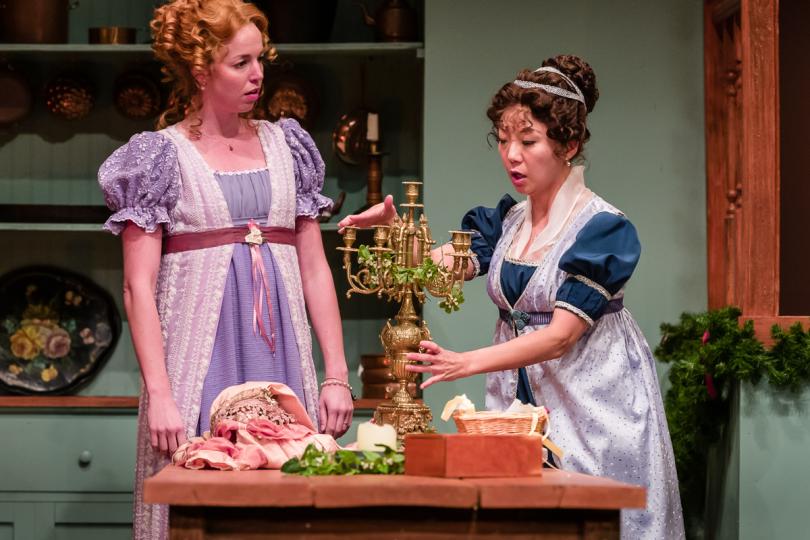“Yes, everyone has a story”

Jungle Theater’s The Wickhams is Austen-esque fanfiction at its best -- it takes characters we know and love and gives them an extension and a life beyond the pages we adored. Of course, the opportunity always abounds to make such a story too trite, too saccharine, too self-referential, and too self-indulgent. Fortunately, The Wickhams avoids a good chunk of these pitfall (and what it does not avoid, can be cheerfully forgiven). After all, if you sign up for a play entitled The Wickhams, you know what you are getting yourself in for! If you sign up for it at Christmas, then get ready to enjoy heartfelt glee.
If you saw Miss Bennet: Christmas at Pemberley at the Jungle last year, this is a companion piece. But instead of being set upstairs amidst the glitz of Regency-era England, The Wickhams takes place in the more modest and humble kitchen. In a nod towards the many upstairs/downstairs dramas that now abound, this play seems to argue that even in a quasi-palace like Pemberley, the center of a home is the kitchen (and the biscuits it contains!).
The prideful Fitzwilliam Darcy [James Rodríguez] and quick-witted Elizabeth Darcy (formerly Bennet) [Sun Mee Chomet] take secondary roles in The Wickhams. This Christmas story circles around the concerns and choices of Lydia Wickham (formerly Bennet) [Kelsey Dodion], and a pair of servants named Cassie [Roshni Desai] and Brian [Jesse Lavercombe].
Lydia is, as everyone predicted, rather unhappily married to the pernicious Wickham, whose gambling and “high spirits” constantly make their shared life precarious. Still too loud and too brash, Lydia has grown up considerably, and now knows enough about the world to question her initial choice of Wickham. Elizabeth, too, is conscious that she and Darcy might not have fully weighed the amount of unhappiness they settled upon Lydia by forcing Wickham to marry her. Reflecting these choices are Cassie and Brian, who, while clearly falling in love, choose a more practical route of self-expression and actualization instead of confining marriage. Is this a bit revisionist in Regency-era England? Absolutely. But I understand the playwrights’ impulse: Lauren Gunderson and Margot Melcon understand the cultural importance we currently place on the Bennet sisters and their matrimonial fates, and by co-opting this traditional story, they point towards questions of propriety and scandal that are still very much alive today. Giving Lydia a second chance at love and happiness is a kind and generous thing to do, and even if it doesn’t make much sense in her own time period, feels very much in keeping with ours.
Perhaps the best part of this production is that it is so utterly obvious that the actors are having a good time. Sun Mee Chomet as Elizabeth Darcy practically dances across the stage, Kelsey Dodion as Lydia Wickham is exuberant, exhausting, and very, very funny, and James Rodríguez’s stuffy, slightly wounded, yet caring Fitzwilliam Darcy is a pleasure to watch. Nate Cheeseman as George Wickham is charming but hard-used, and let’s his mask fall more easily than the Wichkham of the novel. The chemistry between Roshni Desai and Jesse Lavercombe is playful and quite charming, and amidst their bouts of flirting, spats, and general good-natured teasing, their tenderness and regard shines through. Both do excellent jobs with lines that sometimes feel a bit perfunctory and anachronistic, and indulge the audience without pandering too hard to us. Fittingly, holding this production together is the serious but loving Mrs. Reynolds, played by Angela Timberman. As no-nonsense as one might expect, Timberman excels at stern warmth, knowing when to discipline and chide and when to defend and care for her charges. She occupies her kitchen, proving herself to be the real master of Pemberley, regardless of whose name is on the door.
Some of the best parts of the production seem to be added by the actors themselves -- a playful look, a teasing imitation -- all connote intimacy and a deep kind of love. Being that so many of this cast is reprising their roles from last year, this familiarity and playfulness makes sense and enhances the potency of this family tale. I would recommend seeing this with friends and family--it’s the perfect balm for holiday overload, and will leave you feeling hopeful and loved.




